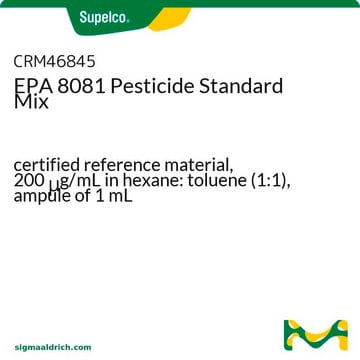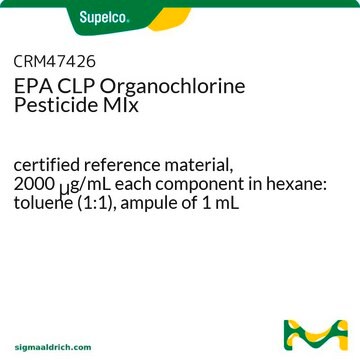61909
Atto Rho14 NHS ester
BioReagent, suitable for fluorescence
Iniciar sesiónpara Ver la Fijación de precios por contrato y de la organización
About This Item
UNSPSC Code:
12352108
NACRES:
NA.32
Productos recomendados
product line
BioReagent
Quality Level
assay
≥90.0% (HPLC)
form
solid
manufacturer/tradename
ATTO-TEC GmbH
extent of labeling
≥90.0%
λ
in ethanol (with 0.1% trifluoroacetic acid)
UV absorption
λ: 624.0-630.0 nm Amax
suitability
suitable for fluorescence
storage temp.
−20°C
Application
Atto Rho14 NHS ester is a new rhodamine featuring a functionality for coupling to bio-molecules such as DNA, RNA or proteins. The label shows strong absorption and extraordinarily high fluorescence quantum yield. ATTO Rho14 is the brightest label available in this wavelength range. The dye exhibits an exceptionally high photostability. In common with most ATTO-labels, absorption and fluorescence are pH-independent in the range of pH 2 to 11, used in typical applications. The dye is moderately hydrophilic. After coupling to a substrate ATTO Rho14 carries a net electrical charge of +1.
Legal Information
This product is for Research use only. In case of intended commercialization, please contact the IP-holder (ATTO-TEC GmbH, Germany) for licensing.
Storage Class
11 - Combustible Solids
flash_point_f
Not applicable
flash_point_c
Not applicable
Certificados de análisis (COA)
Busque Certificados de análisis (COA) introduciendo el número de lote del producto. Los números de lote se encuentran en la etiqueta del producto después de las palabras «Lot» o «Batch»
¿Ya tiene este producto?
Encuentre la documentación para los productos que ha comprado recientemente en la Biblioteca de documentos.
Chao Ma et al.
Analytica chimica acta, 734, 69-78 (2012-06-19)
This article describes the design and preparation of a novel fluorescence resonance energy transfer (FRET)-based ratiometric sensor with the polymer nanoparticle as scaffold for detecting Hg(2+) in aqueous media. In this study, a fluorescent dye fluorescein isothiocyanate (FITC, served as
Yuan-Qiang Sun et al.
Angewandte Chemie (International ed. in English), 51(31), 7634-7636 (2012-06-08)
Probes to dye for: Rhodamine-inspired Si-pyronine, Si-rhodamine, Te-rhodamine, and Changsha NIR dyes have been developed recently. These dyes show fluorescence in the far-red to near-infrared region, while retaining the advantages of the original rhodamines, such as high fluorescence quantum yield
Raphael Alford et al.
Molecular imaging, 8(6), 341-354 (2009-12-17)
Fluorophores are potentially useful for in vivo cancer diagnosis. Using relatively inexpensive and portable equipment, optical imaging with fluorophores permits real-time detection of cancer. However, fluorophores can be toxic and must be investigated before they can be administered safely to
Jan Klohs et al.
Basic research in cardiology, 103(2), 144-151 (2008-03-08)
Light in the near-infrared (NIR) region between 700-900 nm can penetrate deep into living tissue, thereby offering a unique opportunity to use near-infrared fluorescence (NIRF) imaging techniques to detect and visualize fluorescent probes in-vivo. In the past few years, many
Chunbai He et al.
Biomaterials, 33(33), 8569-8578 (2012-08-22)
Polymeric nanoparticles have been widely applied to oral delivery of protein drugs, however, few studies focused on the systematical elucidation of the size-dependent oral absorption mechanism with well-defined polymeric nanoparticles. Rhodamine B labeled carboxylated chitosan grafted nanoparticles (RhB-CCNP) with different
Nuestro equipo de científicos tiene experiencia en todas las áreas de investigación: Ciencias de la vida, Ciencia de los materiales, Síntesis química, Cromatografía, Analítica y muchas otras.
Póngase en contacto con el Servicio técnico



